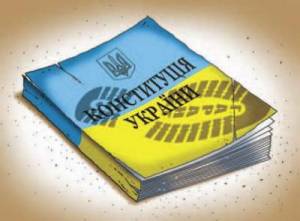Parliament, not the Constitutional Assembly, will have the decisive role

Ihor Kohut, Head of the Laboratory of Legislative Initiatives is one of the members of the Constitutional Assembly, created by the President a few months ago, and due to have its first meeting on 20 June. On the eve of the meeting he spoke with the Deutsche Welle Ukrainian Service about the Constitutional Assembly’s prospects.
Asked about his assertion in a recent publication that the Constitutional Assembly lacks legitimacy he explained that such a body is normally a special representative body which includes different groups in society who work on the text of the Constitution and on various aspects of correlating the government, bodies of local self-government and human rights. This is what is happening in Tunisia and many other countries, with a special constitutive body being elected through special procedure.
In Ukraine, however, there is a consultative board under the President. “In fact this is a kind of highly qualified advisory board aimed at discussing key points, agreeing positions and proposing a view of a new version of the Constitution to the President in order to later within the framework established by the Constitution recommend doing or not doing something.
Ihor Kohut was asked if the body could be considered legitimate if members of the opposition have refused to take part in it.
“If we’re speaking only about the level of experts of an advisory body under the President, we mean an ordinary working group which discusses, agrees positions, uses the experience of various countries and constiutitonal models in order to perfect what we already have. When it reaches the political dimension, then we need to understand that according to the Constitution any changes are made solely by the Verkhovna Rada. Of course some positions can be submitted and affirmed by a national referendum, but this is largely parliamentary procedure. Without parliament, we of course can’t speak seriously about constitutional modernization.”
He suggests that later meetings will be after the parliamentary elections and it may be that the Verkhovna Rada will be more involved in the process.
It is hard at this time to say what role the Assembly will have, It is only a consultative body whose recommendations the President can reject. He suggests that it would be good if the President would already now make his position clear so that the members knew what they were dealing with, whether to continue or refuse to take part in the process.
They have already had such experience where the President created a working group on reform of electoral legislation. The President presented his proposals regarding a specific electoral system, specific threshold, status of parties and blocs, with the members of the group left to decide the rest. Here, he says, it is fortunately not like that. The President has somewhat distanced himself from the Assembly. Kohut says that he sees the Assembly as a good platform for discussion, where views and concepts can be agreed, but no more.
He stresses that it is parliament which makes the actual decisions, and therefore voters will be playing a crucial role this year.
What he believes needs to be changed
- the Constitution needs to be made more realistic, with there being too many declarative provisions, with regarding to a social and law-based state.
Many are seriously restricted from the budgetary or other point of view.
The Constitution should provide the mechanisms to ensure judicial independence and proper rulings.
Balance in the system of power so that the branches of power are more equal and have the relevant levers of influence on each other.
More powers for the regions; decentralization.
Kohut says that he himself supports a parliamentary system, where parliament plays a greater role. He believes the President’s powers were extended in a questionable manner.
There can be no question that he should be elected by parliament, and certainly not retaining the powers he has now.
Abridged from the interview here: http://dw.de/dw/article/0, , 16037978, 00.html





